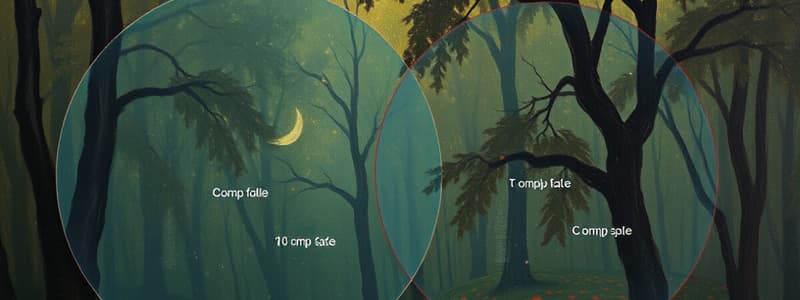Podcast
Questions and Answers
What does a probability value of 0 signify?
What does a probability value of 0 signify?
- Certain to happen
- No chance of occurring (correct)
- Equally likely to happen or not
- Unlikely to happen
What defines two events as independent?
What defines two events as independent?
- The occurrence of one event does not influence the other. (correct)
- The events share a common outcome.
- Both events cannot occur together.
- The occurrence of one event impacts the other.
Mutually exclusive events can occur at the same time.
Mutually exclusive events can occur at the same time.
False (B)
Dependent events have no effect on the probability of each other occurring.
Dependent events have no effect on the probability of each other occurring.
What is the sample space in a probability experiment?
What is the sample space in a probability experiment?
In a tree diagram for three students asked if they like statistics, the outcomes can be 'Yes' and _____
In a tree diagram for three students asked if they like statistics, the outcomes can be 'Yes' and _____
How is classical probability assessed?
How is classical probability assessed?
The odds for an event can be expressed as __ to __.
The odds for an event can be expressed as __ to __.
Match the following terms with their definitions:
Match the following terms with their definitions:
Which of the following is an example of an event of interest?
Which of the following is an example of an event of interest?
Match the type of probability assessment with its definition:
Match the type of probability assessment with its definition:
If a company has 3 male and 7 female employees, what is the probability of selecting a female?
If a company has 3 male and 7 female employees, what is the probability of selecting a female?
A probability value can exceed 1.
A probability value can exceed 1.
The probability of Audrey passing is 0.4.
The probability of Audrey passing is 0.4.
The universal set is represented by the symbol _____ and is defined as all numbers less than or equal to 10.
The universal set is represented by the symbol _____ and is defined as all numbers less than or equal to 10.
What is the probability that both Audrey and Sarah passed their test?
What is the probability that both Audrey and Sarah passed their test?
The odds against the removal of import restrictions are expressed as :.
The odds against the removal of import restrictions are expressed as :.
What is the combined probability that neither Audrey nor Sarah passed?
What is the combined probability that neither Audrey nor Sarah passed?
Flashcards are hidden until you start studying
Study Notes
Probability Fundamentals
- Probability measures the chance of a specific event occurring, ranging from 0 (impossible) to 1 (certain).
- A probability of 1 indicates absolute certainty, while 0 signifies no chance of occurrence.
Experiments and Sample Spaces
- An experiment produces outcomes that are not predictable in advance.
- Sample Space is the collection of all possible outcomes from an experiment.
- For example, surveying three students about liking statistics leads to outcomes: ‘No’ and ‘Yes’.
Venn Diagrams
- Venn diagrams visually express sample spaces and events.
- The universal set (sample space) is represented as a rectangle, while events are enclosed within circles.
- Example: A is odd numbers, B includes numbers greater than 5.
Events of Interest
- Events represent outcomes from experiments.
- For instance, in an experiment involving students arriving on time, outcomes could include getting there early, on time, or late.
Types of Events
- Mutually Exclusive Events: Two events cannot occur simultaneously (e.g., selecting a black card and a red card is mutually exclusive).
- Independent Events: The occurrence of one event does not affect the other (e.g., starting a business in different locations).
- Dependent Events: The outcome of one event impacts the probability of another (e.g., selecting employees impacts the makeup of subsequent selections).
Probability Assessment Methods
- Classical Probability: Based on the ratio of successful outcomes to total possible outcomes when events are equally likely.
- Relative Frequency Probability: Probability derived from historical data, defined as the ratio of the number of times an event occurs to the total trials.
Probability as Odds
- Probabilities can be expressed as odds, indicating likelihood for or against an event.
- Example: In the tyre industry, a 60% probability translates to odds of 3:2 for removal of restrictions and 2:3 against.
Example Calculation: Audrey and Sarah's Test
- Independent events are identified based on probabilities:
- P(Audrey passing) = 0.6, P(Sarah passing) = 0.75.
- The probability of both passing: 0.6 x 0.75 = 0.45.
- The probability of neither passing: 0.4 x 0.25 = 0.1.
- The probability of only Audrey passing: 0.6 x 0.25 = 0.15.
- The probability of only one passing: (0.6 x 0.25) + (0.4 x 0.75) = 0.45.
Rules of Probability
- Logical frameworks guide the calculation and interpretation of probability, ensuring consistency and accuracy.
Studying That Suits You
Use AI to generate personalized quizzes and flashcards to suit your learning preferences.




